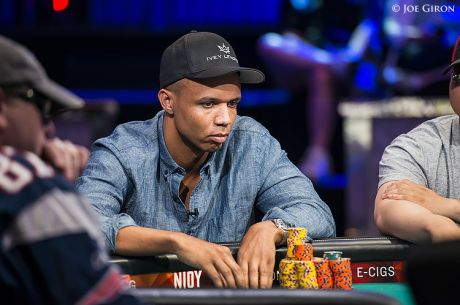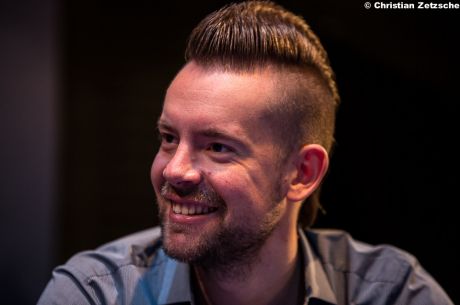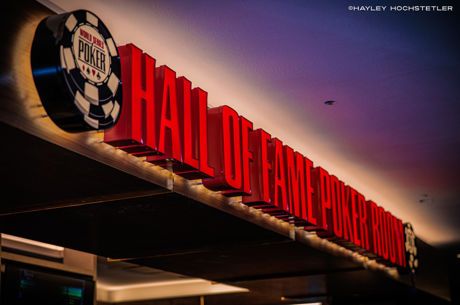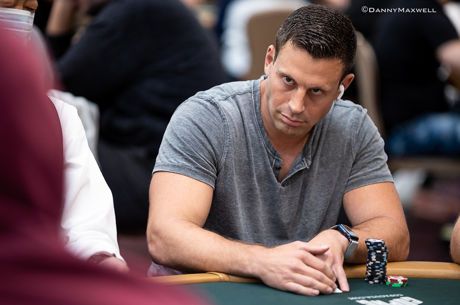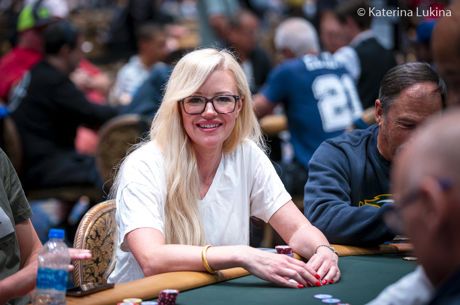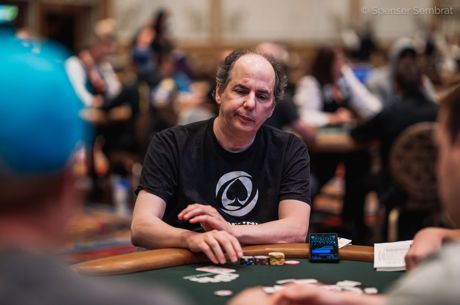Five Thoughts: PokerStars Rake Increases, Phil Ivey's Medicinal Marijuana, and More

At the start of each work day, what is your objective? Do you pour yourself a cup of coffee, sit down at your computer, and calculate the amount of money you will earn that day? Do you allow that amount of money to dictate how hard you work or how you use your resources?
Perhaps this is the wrong audience to pose that question to. Poker players tend to be obsessed with their hourly rates, quantifying every little decision with dollars and cents. I’ve even heard poker players refer to the price of commercial goods in buy-ins, not wanting to cut into their bankroll for dinner and a movie.
Personally, I see work as a place to meet objectives and accomplish goals. Obviously we all need to make money in order to pay rent (or a mortgage if you’re a grown up), buy groceries, and happily function in society, and our companies need to make money in order to pay us, reward investors, and grow. But, even though business is about money, there has to be something driving us to punch the clock every morning. If not, what’s the point? There will always be extreme cases where individuals will have to work menial jobs just to get by, but even then there are opportunities for anyone to take pride in their work.
Even the super successful people amongst us aren’t all driven by the almighty dollar. Not all entrepreneurs flex their brilliance solely for capital.
We’re told that all decisions are driven by the almighty dollar, and if that’s true then it’s a condemnation of society. In many places of work, if not all, there are mission statements and key words plastered all over the walls. They may be cheesy and corny, but someone put time and effort into creating them and they have a purpose.
Moreover, the best coworkers I’ve ever encountered were all passionate about upholding those cheesy and corny words written on the wall.
One month ago, after PokerStars parted ways with a handful of Team Pros, including 2009 WSOP Main Event winner Joe Cada, we discussed “business decisions.” Unfortunately there are times where we have to make tough decisions at work, and during these times there will likely be pressure from the powers at be to uphold fiscal responsibility. Sometimes it has to be about the money, and that’s OK if it is indeed “sometimes.”
With Amaya Gaming, a publically traded company, we knew there were going to be some changes at PokerStars. It was inevitable. Amaya didn’t spend $4.9 billion to sit back and twiddle their thumbs. Adjusting their ambassadorship strategy is easy and only affects a small number of people. It’s an easy pill to swallow. Some started to question the company’s intentions and their need for economic gain, but the mob wasn’t too loud or out of control.
Yet.
PokerStars upped the ante last week, announcing rake increases that took into effect on Tuesday. This change will adversely affect nearly every player on the site, and has been met by a justifiably angry assortment of casual players, grinders, and super stars.
1. Increased Rake at PokerStars
Days after the introduction of a new currency exchange rate, also met by disapproval, PokerStars announced rake increases across a myriad of games and formats. You can find a breakdown of changes below and , one of the only places PokerStars broadcast the news.


These changes were preempted by a blog from Eric Hollreiser, Head of Corporate Communications for PokerStars, titled and followed by a blog post from Team PokerStars Pro Daniel Negreanu titled
You can find a compilation of reactions from, among others, Phil Galfond, Shannon Shorr, and Ola "Odd_Oddsen" Amundsgard in an article here.
There is also a great post from Talal Shakerchi, a UK businessman and a regular on the European Poker Tour, over on TwoPlusTwo, .
I find it hard to believe that people are surprised with this news. PokerStars is the best game in town and they command an overwhelming market share, allowing them to maximize their potential profits if they chose to. What are you going to do, play somewhere else? According to Poker Scout, PokerStars' seven-day average is 18,500 players — nearly eight times as large as their closest competitor, 888poker.
PokerStars' 24-hour peak, 30,272 players, is more than eight times 888's peak of 3,599 players.
From a pure business standpoint, increasing the rake is a no-brainer guarantee for short-term economic growth and, if PokerStars continues to dominate the market, all negative effects will be limited.
If you're a bean counter, and someone tells you that consumers are eight times more likely to buy your product because it's superior to the competition, yet you're selling it for cheaper than the competition, there's only one real conclusion. Up the price. And, per a tweet from Rupert Elder, all PokerStars did .
Players didn't fall in love with PokerStars because of their bean-counting abilities, however. Capitalistic gain, or "Bankroll Management" as Hollreiser put it, doesn't build communities and drive consumer support of a brand. You can spin these changes all you want, but don't expect the paying customers to silently nod in agreement and load up a few more hypers.
It's fair to implement new strategies to make money, especially after being acquired by a publicly traded company, but it's wholly unfair to ignore the customer entirely, especially in a communal environment like poker. PokerStars grew to be the best online poker brand in the world because they worked alongside the players to provide the best experience possible, not because they counted beans more efficiently than their competitors.
If they want to remain atop the poker ecosystem, PokerStars will either need to rebuild the bridge between their brand and the players or continue to mercilessly destroy the competition, retaining their massive stranglehold on the market share. If done correctly they can likely achieve both of these goals in the process, but if they don't rehabilitate their relationship with players and a worthy competitor emerges, then things may get dicey.
I appreciate Shakerchi's thoughtfulness and his ideas for players to protest if they see fit, but I doubt the organizational skills and the drive of most individuals in the poker community. On the whole, players have reacted negatively to the news, but PokerStars' traffic hasn't taken a significant hit in the interim. Moreover, if the best players in the world chose to boycott, it will only open up opportunities for players who were previously break-even performers to increase their volume and feast on the leftover fish.
If there are going to be positive changes with PokerStars, they will come from London and the Isle of Man. They will come from those who understand the importance of their customers and the poker community as a whole. They will come from those dedicated to the cheesy and corny words plastered all over the walls.
2. O'Dwyer Tops Talented ACOP MBP Super High Roller Final Table
The 2014 ACOP "Billionaire Poker" series is underway in Macau, and two of the marquee events are already in the books. Irishman/American Steve O'Dwyer topped a field of 102 entries to win the HK$500,000 Super High Roller for HK$14,050,000 ($1,811,638), the largest score of his career. O'Dwyer defeated Ryan Fee heads up, Fee earned $1,282,975 for his efforts, and was joined at the final table by a sick lineup of pros, including none other than Dan Colman.
Final Table Results
| Place | Player | Prize (USD) |
|---|---|---|
| 1 | Steve O’Dwyer | $1,811,638 |
| 2 | Ryan Fee | $1,282,975 |
| 3 | Praytush Buddiga | $844,571 |
| 4 | Connor Drinan | $657,605 |
| 5 | Joseph Cheong | $528,663 |
| 6 | Kitson Kho | $438,403 |
| 7 | Daniel Colman | $373,932 |
| 8 | Davidi Kitai | $312,091 |
O'Dwyer now has over $7 million in career tournament earnings, including more than $4.3 million over the past two years. The Irishman's previous largest cash came in May of 2013, when he won the EPT Grand Final Main Event and $1.6 million.
Prior to the 2014 ACOP, O'Dwyer hadn't has a live cash since EPT Sanremo, choosing to skip the entire WSOP.
In a post-win interview with PokerNews' Remko Rinkema, O'Dwyer spoke about his win and specifically about the money he won. It’s no secret that most professionals in these events have tiny pieces of themselves," said O'Dwyer, "and I was no different this time."
To hear more about what O'Dwyer had to say, check out the full video below:
Although this is his second-smallest six-figure score this year, Colman's career year continues with another final-table appearance. The $373,932 he earned pushed his career live tournament earnings to nearly $22.9 million, and he now has nine final tables under his belt in 2014 alone. There are a few more super high rollers left for Colman to dip his toes in, including WPT Alpha8 St. Kitts and EPT Prague.
Connor Drinan went viral during ESPN's broadcast of the $1 Million BIG ONE for ONE DROP, losing with pocket aces against the pocket aces of Cary Katz. Drinan played very well in that event and the $25,000 satellite in order to qualify for the BIG ONE, and continues to make a name for himself with a fourth-place finish in this event for $657,605.
Wai Tung Lo emerged victorious in the HK$25,000 Warm Up event, defeating Louis Salter, brother of Jack Salter, heads up to win HK$1,197,350 ($154,385). Salter earned the exact same amount as the two chopped.
Final Table Results
| Place | Player | Country | Prize (USD) |
|---|---|---|---|
| 1 | Wai Tung Lo | Hong Kong | $154,385 |
| 2 | Louis Salter | UK | $154,385 |
| 3 | Ami Barer | Canada | $75,700 |
| 4 | Kiyokazu Nishikawa | Japan | $59,763 |
| 5 | Markus Garberg | Norway | $47,810 |
| 6 | Edison Nguyen | Australia | $39,842 |
| 7 | Mikhail Mazunin | Russia | $31,883 |
| 8 | Kitty Kuo | Chinese Taipei | $23,931 |
| 9 | Dong Guo | Canada | $19,947 |
2014 Aussie Millions Main Event champion Ami Barer also reached the final table, finishing third for $75,700, and fan favorite Kitty Kuo exited in eighth place, pocketing $23,931. Barer has several impressive results in the Asia-Pacific region, nearly reaching the final table of a bracelet event at WSOP Asia-Pacific.
3. Ivey Approved for Las Vegas Medicinal Marijuana Dispensaries
According to the Las Vegas Review-Journal, Phil Ivey is among 26 people who have been approved for a city permit to distribute medicinal marijuana by Las Vegas City Council members. The news led to a few raised eyebrows within the poker community and even more bad puns.
Seriously, Phil Hi-vey? Pot committed?
(Personally I think he should name his dispensary “Tokers Wild,” but that’s none of my business).
This news comes on the heels of Ivey’s lost court case to Crockfords Casino, costing him $12.4 million, and an announcement that Ivey Poker will shut its virtual doors for the foreseeable future. Ivey is reportedly appealing Crockfords’ ruling, as he should, and preparing to defend himself in a similar case against Borgata Hotel Casino & Spa.
Citizens of the United States are beginning to develop a more liberal approach to marijuana. The drug is now legal in two states, Colorado and Washington, and has been decriminalized in a dozen others, including California, New York, and Massachusetts. Many believe that marijuana laws will continue to relax as merchants continue to maximize the drug’s commercial viability.
Despite our relaxing approach, it is still interesting to see Ivey dip his toe in the pool. He was just on 60 Minutes Sports vehemently denying cheating allegations in order to restore his image, and now he is willingly risking his reputation, albeit in the eyes of the few, in an effort to make a little bit of money. Again, most people don’t care, including yours truly, but there is a segment of the population that Ivey will need to be his customers if he ever gets a real money gaming operation off of the ground that will be further perturbed by this development.
Perhaps taking a small hit to his reputation pales in comparison to losing out on $12.4 million, however. Ivey is a businessman who is always looking for his edge, and the increasing liberalization of marijuana could potentially net him a very large chunk of money, especially in Sin City.
4. Potential FBI Chicanery?
Speaking of sinning in Las Vegas, there are new developments in a case against Paul Phua, his son, and six others in an alleged illegal betting operation. In July, Phua and company were arrested at Caesars Palace Las Vegas for in an alleged FIFA World Cup™ betting sting, but new evidence could save the Macau super high roller.
The defense lawyers claim that the FBI violated the Fourth Amendment of the U.S. Constitution, purposefully shutting off the internet at Caesars and then posing as service technicians to obtain crucial evidence that led to a search warrant. The defense believes that if the judge knew that both Caesars and the FBI allegedly colluded to illegally conduct the first raid, that the search warrants would have never been issued.
"The notion that an individual 'consents' to such searches — so that the government is free to ignore the Fourth Amendment’s explicit warrant requirement — is, in a word, absurd.
"Our lives cannot be private — and our personal relationships intimate — if each physical connection that links our homes to the outside world doubles as a ready-made excuse for the government to conduct a secret, suspicionless, warrantless search. Only a few remote log cabins lack any Internet, electric, gas, water, cable, or telephone service. But the Constitution does not require us to sever all those connections — and live as hermitic luddites — to protect ourselves from the government’s prying eyes and secret cameras.
"A ruling upholding these intrusions would cause innocent Americans to live their daily lives burdened with the palpable sense that their government is regularly scheming to spy on them in their homes."
Ivey has publically defended Phua’s character, and both Tom Dwan and Andrew Robl have shown support as well. Dwan even tweeted an NPR article about the latest news. It was his first tweet since July 8, the week before Phua and company were arrested.
— Tom Dwan (@TomDwan)
Regardless of the outcome of the case, and this is something I’ve written and spoke about since July, I don’t think we’ll ever see these Macau super high rollers at an event with reporters and cameras. They will always be able to find a private game that isn’t being recorded by any media outlets, and this entire episode in Las Vegas, even though it had nothing to do with the WSOP festival in and of itself, likely left them with a sour taste in their mouth. Likewise, they don’t need media exposure in order to push their brands or make them wealthier.
All the spotlight will do is allow us to recall these events and perhaps question how they are capable of playing all of these big buy-in events without information of companies they own or organizations they are attached to.
It will also be interested to see if anything happens with Robl or Dwan. Will there association with Phua have adverse effects on their relationships with casinos, or will nothing change? These are the stories we should be monitoring as this case continues to twist and turn out in the desert.
5. WSOP Main Event Numbers
For the second consecutive year, PokerNews provided hand-for-hand coverage on Day 7 of the WSOP Main Event. This allowed the wizard Mickey Doft to go back and analyze some of the data, leading to the following table:
| Seat | Player | Hands | VPIP% | PFR% | RR% |
|---|---|---|---|---|---|
| 1 | Billy Pappas | 197 | 17.8% | 13.2% | 5.6% |
| 2 | Felix Stephensen | 178 | 24.2% | 18.0% | 3.4% |
| 3 | Jorryt van Hoof | 197 | 27.4% | 17.8% | 3.0% |
| 4 | Mark Newhouse | 178 | 33.7% | 22.5% | 1.7% |
| 5 | Andoni Larrabe | 202 | 21.8% | 17.3% | 3.5% |
| 6 | William Tonking | 197 | 23.4% | 16.2% | 3.0% |
| 7 | Dan Sindelar | 220 | 26.8% | 19.1% | 4.1% |
| 8 | Martin Jacobson | 196 | 23.5% | 16.3% | 2.6% |
| 9 | Bruno Politano | 178 | 18.5% | 10.7% | 3.4% |
As someone who predicted victory for back-to-back November Niner Mark Newhouse, I don’t know how to feel about his 33.7% VPIP. My initial thoughts are that it’s insane, but maybe he’s just supremely confident in his post-flop skills that he’s willing to play a lot looser preflop and take advantage of his opponents on later streets. His 1.7% reraise percentage certainly helps this theory, showing that he would rather flat a raise and play post flop than get multiple bets in the middle before the first three community cards are fanned.
Still, I’m a little worried about his willingness to get involved. I recently spoke with one player who was among the final 27, and he didn’t think Newhouse had a very good chance of winning.
“He’s just a spaz,” the player put it bluntly.
Unsurprisingly, chip leader Jorryt van Hoof has the second-highest VPIP. Van Hoof is a cash game player with all of the chips, so he was simply leveraging his stack and his skills. The only two players with VPIPs under 20% were Billy Pappas (17.8%) and Bruno Politano (18.5%).
Despite his unwillingness to voluntarily put chips into the pot, Pappas had the highest reraise percentage at 5.6%. It seems like the foosball world champion is unwilling to mix it up if he doesn’t have to, and thus far that’s worked just fine.
I am curious as to how many players at the table already compiled this information, if any, and how many of them will actually use it now that it has been compiled for them. Most likely all of these players have a sense for what these numbers were just from playing with their eight competitors, but actually seeing the statistics could shed some light on previously undiscovered tendencies.
Providing hand-for-hand coverage on Day 7 is one of the more exciting things I’ve done at PokerNews, and I’m glad we’re able to capitalize on the information and provide some interesting statistics.
Get all the latest PokerNews updates on your social media outlets. on Twitter and find us on both and !


